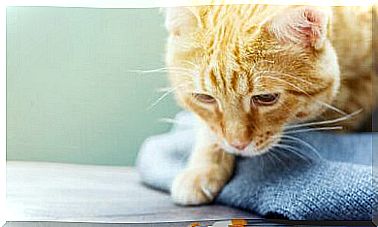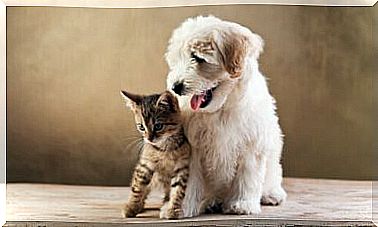Is It Dangerous To Have A Cat During Pregnancy?
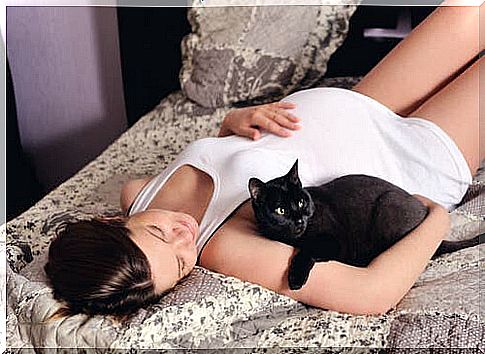
One of the most common questions that pregnant women with cats ask themselves is whether their feline friends could harm their pregnancy. Unfortunately, there are many myths surrounding this topic. In this article we will explain if it is really dangerous to have a cat during pregnancy.
Is living with a cat really dangerous during pregnancy?
If we are talking about a domestic and healthy feline, which receives adequate nutrition and the correct preventive care, there is no reason to believe that living with a cat can be dangerous during pregnancy.
In the past, many felines were infected with a parasite called Toxoplasma gondii , which causes toxoplasmosis. This highly contagious disease can affect pregnant women more easily because their immune systems are more sensitive.
Cats came into contact with this parasite when they ate the flesh and blood of other infected animals. Nowadays, almost all domestic cats eat commercial feed or eat balanced home diets.
For this reason, today the likelihood of a domestic cat coming into contact with Toxoplasma gondii is quite remote, especially if the animal is not allowed to leave the house.
4 reasons why it’s not dangerous to have a pregnant cat
-
Cats are very clean animals
Of all the pets that we could choose, cats are, without a doubt, the ones that take care of their hygiene the most. These animals, in fact, care about the hygiene of both their body and their environment and find it unpleasant to live in a dirty or neglected environment.
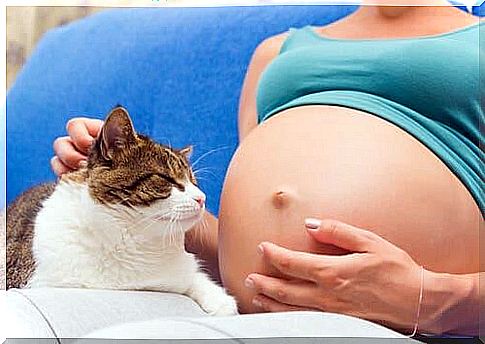
Of course, all living things can get sick for different reasons. However, since they observe strict hygiene rules, cats are exposed to fewer pathogens. Because of this, they are less likely to contract and transmit diseases.
Undoubtedly, street cats are necessarily exposed to unhealthy living conditions, as well as get involved in fighting. Due to these unfavorable living conditions, the feline population living along the roads is the most vulnerable to the most common diseases among cats.
Therefore, when adopting a cat, it is essential to take him to the vet as soon as possible, to examine his state of health and give him vaccines and pesticides.
-
A cat can transmit fewer diseases than other pets
As we have seen, the false myth that cats are harmful to pregnant women is due to the risk of contracting toxoplasmosis. This disease, however, is increasingly rare among felines who lead a domestic life and eat commercial feed.
In fact, it is unlikely that cats who do not leave the house and follow a controlled diet can contract diseases that are transmissible to humans. The reason lies mainly in the fact that the main form of contagion of these diseases occurs through contact with the body fluids of other cats or through the consumption of other infected animals.
Furthermore, it should be noted that there are very few diseases that a cat could transmit to humans. Dogs, for example, can transmit twice as many as felines.
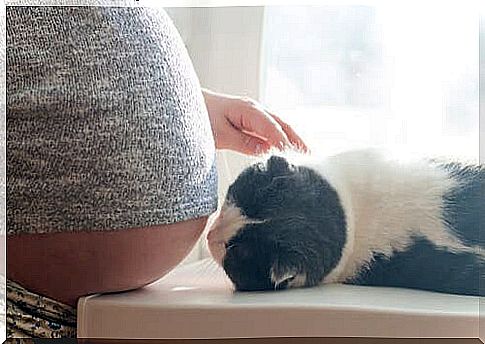
-
If you are not allergic, they will not cause you allergies
There is also a false belief that cat hair could hurt the expectant mother and lead to an allergic process. It is true that some women may be allergic to cats, but it is difficult for them to become allergic only during pregnancy.
However, it is possible that some women may find that they are allergic when they are pregnant due to an increase in their sensitivity. Likewise, there are hypoallergenic cat breeds or, in other words, suitable for allergic people.
Furthermore, it is important to point out that more than 80% of people “allergic to cats” are not, in fact, allergic to their fur. Allergic responses in the presence of felines are usually caused by the Fel D1 protein, which is concentrated in the skin, saliva and some other organs of cats.
A cat can be the best company for your children
The positive effects due to the presence of pets have been demonstrated in the physical, cognitive, emotional and social development of children. In fact, coexistence with cats is definitely positive for the little ones of the house.
Perhaps many people may think that cats are better companions for their children. Nevertheless, even cats (especially females) are very attentive and affectionate towards children, especially the little ones.
Of course, if we want a cat to coexist peacefully and friendly with a child, we need to introduce them correctly. To do this, the ideal is to start socializing our kittens from an early age, in order to introduce them to other cats, dogs and humans, adults and children.

